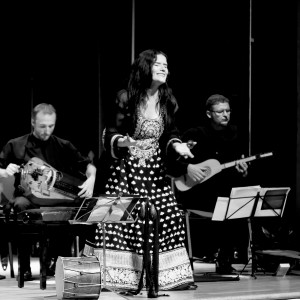Scroll down for English**
No cabe duda de que Mara Aranda es una de las intérpretes más internacionales de música sefardí. Comenzaba su gira el pasado marzo visitando Varsovia (Polonia), para seguir por Praga (Rep- Checha), Sarajevo (BYH), o Sofia (Bulgaria). presenta su álbum dedicado al repertorio sefardí ‘legado sefardí’ en el CENTRO CULTURAL SGAE en Valencia.
Innumerables ejemplos de estilo de vida de los judíos-españoles se han mantenido y se reflejan en sus canciones. Son aquellas tradiciones que fueron transmitido oralmente de padres a hijos y se han conservado durante más de 500 años después de su expulsión. Estas canciones nos hablan de sus sentimientos personales, sus celebraciones, fiestas y rituales, sobre acontecimientos históricos relacionados con el Antiguo Romancero, una joya de la literatura española que se acumula una verdadera manifestación de nuestra historia y es una de las representaciones más importantes de la vía oral la literatura de nuestros pueblo
Mara Aranda es muy conocida después de dos décadas actuando en los principales escenarios europeos siendo una de las intérpretes más internacionales que aparecieron en la escena española en la última década del siglo XX. Ha interpretado canciones turcas, griegas y occitanas música y cantigas del repertorio de trovadores y los sefardíes, imprimiendo un fuerte sentimiento emocional y una identidad mediterránea y haciendo de Mara Aranda una de las mujeres mediterráneas, embajadora de su culturas y tradiciones antiguas.
Como investigadora e intérprete de música sefardí, Mara Aranda hace hincapié en la importancia de la música y canciones que han sido parte de la vida de los judíos en la Península, hasta el siglo XV, y en África del Norte y el Imperio Otomano después.
Mara Aranda presents his album dedicated to Sephardic repertoire ‘Sephardic Legacy’ in the SGAE CULTURAL CENTER in Valencia. Lots of examples of the Spanish-Jews’ way of living have remained and they reflect in their songs those traditions that were transmited orally from parents to sons and preserved during more than 500 years after Jews’ expulsion. These songs tell us about their personal feelings, their celebrations, parties and rituals, about historical happenings connected with the Old Romancero, a jewel in the Spanish literature that accumulates a true manifestation of our History and it’s one of the most important representations of the oral literature of our people.There are several kind of songs included in the album and performed in the concerts: songs from the Eastern zone of the Diaspor, like the dramatic lullaby from Sofia (Bulgaria), ‘Nani Nani’, where the mother is sleeping her son while she sings about the infidelity and indifference of his father; other songs from nearer places of Iberian Peninsula, Northern Africa, like ‘D’oy en este dia’, a wedding kantika where the mother advise her daughter, whose wedding day is near.
In Sephardic Legacy we’ll find the sound of the instruments from medieval Spanish tradition, and others from Northern Africa tradition and the Eastern Mediterranean tradition too, following the example of the Sephardic people, who adapted their music to the own style and instruments of the zones they settled,always in constant evolution. Far from closing windows and doors to hide away that ancient inheritance, transmited from parent to sons, they opened them widely and this is why we can sing them nowdays and share them with all those History, music and tradition lovers.

